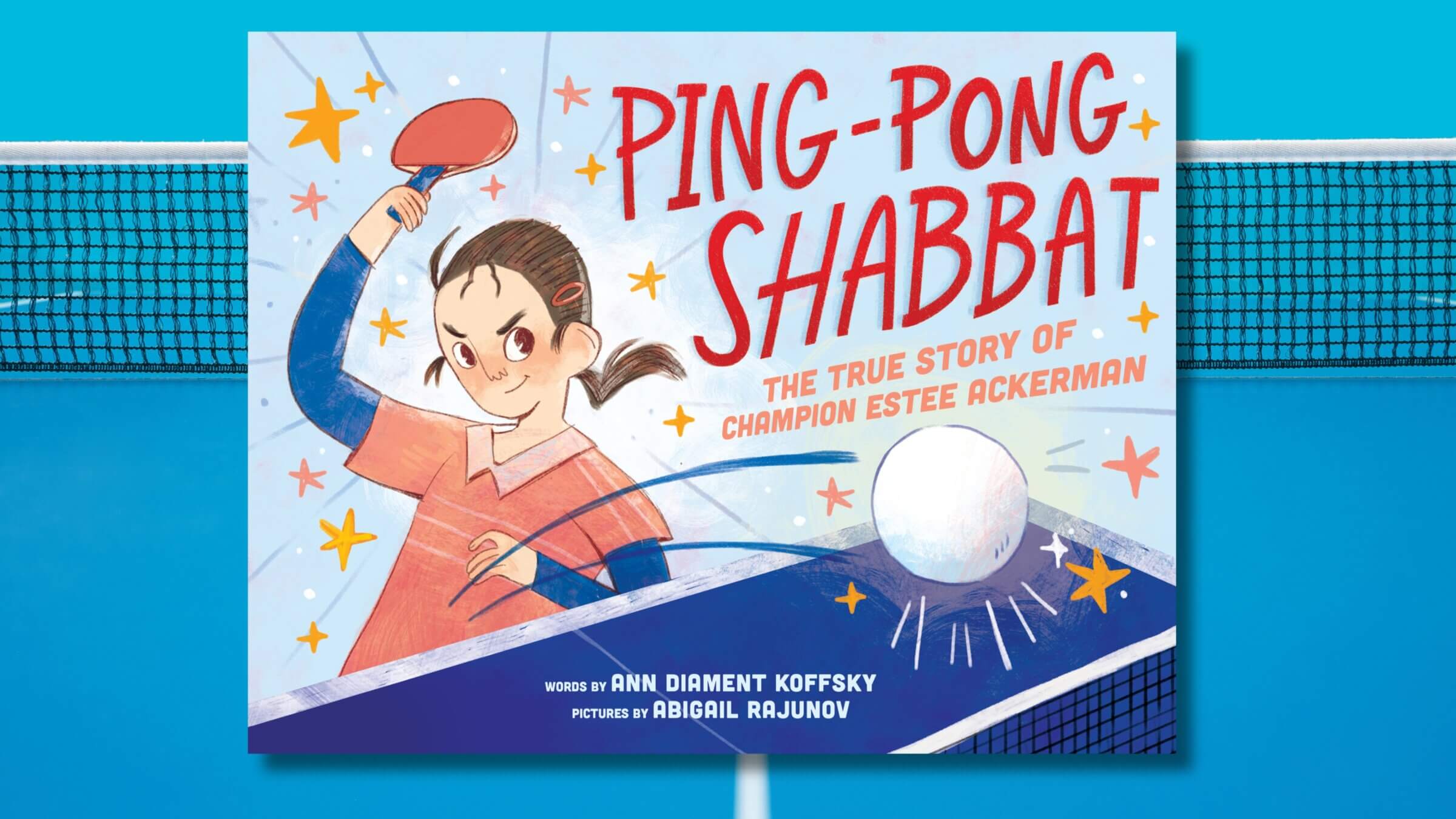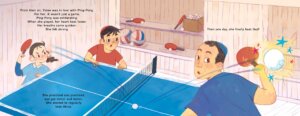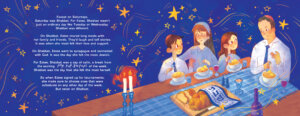She was the Sandy Koufax of ping pong. Now she’s the star of a children’s book.
‘Ping-Pong Shabbat’ puts into print the story of a modern (Orthodox) ping pong prodigy

Author Ann D. Koffsky and illustrator Abigail Rajunov collaborated for Ping-Pong Shabbat, published by Little Bee Books earlier this month. Graphic by Abigail Rajunov / Canva / Little Bee Books / Samuel Eli Shepherd
A new picture book is telling the story of a young girl who takes her Jewish faith into her own hands, one swing of a plastic white ball at a time.
Ping-Pong Shabbat recounts the true story of Estee Ackerman, a Modern Orthodox ping pong sensation from Long Island. At age 11, Ackerman refused to play the final round of the U.S. National Ping Pong Championships because the match landed on Shabbat. She won gold the next year.
It’s a story that flew between different Jewish news media outlets when Ackerman first forfeited in 2013. Over a decade later, children’s author Ann D. Koffsky has now adapted Ackerman’s choice into a book for young readers.

“You’ve heard about Sandy Koufax, well here’s Estee Ackerman!” said Koffsky. She had just finished speaking on a panel of Jewish children’s book authors in Manhattan’s Books of Wonder bookstore.
Like Koufax, who chose not to play baseball on Yom Kippur, Koffsky explained, Ackerman prioritized her commitment to observing the Sabbath over a chance at athletic glory.
But unlike the famous Brooklyn Dodgers pitcher, Ackerman was a preteen girl when she made that decision, not an adult man.
“You want to try to have a child protagonist because you’re writing for children,” said Koffsky, as she finished signing copies of her new book. “Now, the fact that she was a girl athlete and Orthodox? Bonus!”

Koffsky has written over 50 children’s books in her career, including Judah Maccabee Goes To The Doctor and a middle-grade series called Kayla and Kugel. Her books predominantly tackle Jewish perspectives.
“It is what I care about and it is what I know,” said Koffsky, who is herself Modern Orthodox and celebrates Shabbat weekly. “I’m Jewish, so that’s what shows up.”
Koffsky said that she hopes Ping-Pong Shabbat will highlight the Modern Orthodox movement, a segment of American Jewry she sees as underrepresented. She also said she hopes the book challenges stereotypes about Orthodox women more generally.
“The general world certainly has a stereotype of Orthodox Jewish women as deferential and modest and retiring and quiet,” she said. “But then Boom! She plays ping pong.”
Bringing talent to the table (tennis)
Koffsky lives in the same Long Island suburb as Ackerman’s family, where Ackerman’s story is a local legend. They first met two years ago when they were each providing programming at the same Passover hotel: a resort for families observing the holiday.
“I was there as an author doing my author thing and she was there to play ping pong,” Koffsky said. While working at the hotel, Koffsky observed a match between Ackerman and her brother, Akiva, when she witnessed Ackerman’s ping pong prowess in person.
“I was like, Oh! I’ve never seen anything like this,” she said. She approached Ackerman shortly thereafter and got her blessings to adapt her life into a picture book.
Koffsky then connected with Abigail Rajunov, a first-time book illustrator from Dallas.
In scenes where the characters play ping pong, Rajunov uses colorful comic-book-style onomatopoeias to convey Ackerman athleticism: “Smash!” “Pop pop!” “Ker-Pow!”

Then there was the panel where Ackerman and her family gathered around for Shabbat dinner. Rajunov worked hard to get the rituals right.
“I had both challahs cut up because that’s how my family did it,” said Rajunov, who grew up in the Conservative movement. “I would get notes back from Anne, and she was like, this is how Orthodox people do it.”

In another panel, Rajunov conveys Ackerman wrestling with her big decision whether to compete in the championship. Shabbat candles and ping pong rackets swirl in the background.
Rajunov, 23, said that scene resonated with her as a young person also trying to figure out what to do with her life.
“Everybody has an opinion of what they think you should do, but at the end of the day, it’s your choice and it’s what matters to you,” Rajunov said.
Rajunov emphasized the word “choice,” which she viewed as the book’s ultimate message. Nobody forced Ackerman to withdraw from the championships, not even her parents.
“At the end of the day, it was her choice, not anybody else’s,” Rajunov said. “Stick true to your values,” she said.
Passing the racket forward
Ackerman, now 22, still practices ping pong daily, but she now has a day job, too. She works as a physical education teacher at a Modern Orthodox middle school, where she has founded the school’s first ping pong club.

“Ann not only did a good job, but really an incredible job,” said Ackerman, speaking over the phone from her family’s Long Island basement. She had just finished a round of practice. “I was extremely blessed to have someone like her seek me out.”
Ackerman mentioned how her students have expressed excitement about her new book. She has already signed a few of their copies in class. As she continues to train for future competitions, Ackerman said she hopes the story inspires children, both Jewish and not.
“If you dream big in life and shoot for the stars and really commit yourself to hard work and staying true with your values, incredible things like this could definitely happen to you,” she said.

















